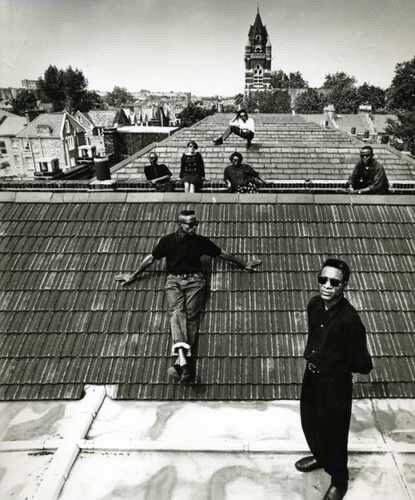ABOUT THE ARTISTS
Formed in Hackney, London in 1982 BAFC comprised black diaspora artists/filmmakers John Akomfrah, Reece Auguiste, Edward George, Lina Gopaul, Avril Johnson, David Lawson and Trevor Mathison. Alongside other collectives such as Sankofa, Ceddo and ReTake, the Black Audio Film Collective too was formed in the early 1980s in the context of the founding of Channel Four and the ACCT Workshop Declaration (both 1982), which encouraged artistic experimentation. By many accounts it was also the expression of a generation of diasporic subjects that seized the idea of “blackness” as an identity marker as well as a claim to political visibility.
Coming together in the formative moments of Cultural Studies and in dialogue with Stuart Hall’s ideas of identity as a (never finalized) process of cultural retrieval, the output of the Black Audio Film Collective is characterized by an immersive and yet highly critical relationship to the (often colonial) archive. BAFC responds to the absence of representation of diasporic subjects by reconstructing the work of personal and collective memories. Or, in the case of the iconic Handsworth Song (1986, about the Handsworth riots of 1985) as a critique of riot newsreels, as well as of the larger trauma of diasporic displacement. Exploring issues of history, memory, displacement, projected criminality, and ideas of identity constructed at the junction between the personal and the political the Black Audio Film Collective’s work employs avant-garde techniques to articulate a black diasporic subject that Britain’s official history, record, and public sphere was determined to ignore or suppress.
Even though the collective dissolved in 1998, some members (Akomfrah, Gopaul and Lawson) founded a production company “Smoking Dogs Films” which has produced several of John Akomfrah’s single-authored films. Among them there is Nine Muses and the celebrated The Unfinished Conversation, a 3-screen installation Akomfrah has currently on sight at the Tate Britain, as well as The Stuart Hall Project, the single-screen film version, which premiered at Sundance in 2013.
liquid blackness in Conversation with David Lawson (BAFC)
and Eddie Chambers (UT at Austin)
SELECTED WORKS
Memory Room 451 (1997)
Dr. Martin Luther King: Days of Hope (1997)
3 Songs on Pain, Light and Time (1995)
The Last Angel of History (1995)
Seven Songs for Malcolm X (1993)
Mysteries of July (1991)
Who Needs A Heart? (1991)
Twilight City (1989)
Testament (1988)
Handsworth Songs (1986)
Expeditions One: Signs of Empire and Expeditions Two: Images Of Nationality (1982-1984)
SELECTED REVIEWS
Moshayedi, Aram. “How John Okomfrah and the Black Audio Film Collective Extended the Boundaries of Black Film Culture.” IndieWire, July 2, 2018. https://www.indiewire.com/2018/07/john-akomfrah-black-audio-collective-film-culture-1201980331/.
Schindel, Dan. “How the Black Audio Film Collective Remixed Fact and Fiction.” Hyper Allergic, March 7, 2018. https://hyperallergic.com/430382/how-the-black-audio-film-collective-remixed-fact-and-fiction/.
Wielgus, Alison. “The Black Audio Film Collective’s Fragmented Cities.” Mediapolis, June 3, 2017. https://www.mediapolisjournal.com/2017/06/black-audio-film-collectives-fragmented-cities/.
Asokan, Ratik. “Memories of Underdevelopment.” Art in America, October 1, 2018. https://www.artnews.com/art-in-america/features/memories-of-underdevelopment-63560/.
SELECTED INTERVIEWS
Fusco, Coco. “Black Audio Film Collective interview.” Diagonal Thoughts, September 10, 2013. https://www.diagonalthoughts.com/?p=1976.



